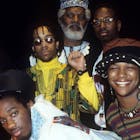
Eminem: The Infamy of Slim Shady At 50
Eminem: The Infamy of Slim Shady At 50
Published Mon, October 17, 2022 at 12:00 PM EDT
He's forever one of the rap game's most popular—and most polarizing—superstars.
But beyond the easiest characterization of Slim Shady as firebrand, there has always been Eminem the emcee. The rapper who came roaring out of Detroit at the end of the 1990s to become one of rap's most unlikely megastars famously built his name as a battle rapper in his hometown before having that name tested repeatedly after he became a chart-topping music star. And as he crafted music over his 25-year career that could be as introspective as it was incendiary, Em showed time and again just how gifted he is as a rapper, as a producer, and as an artist.
"I got on a plane, and I was thinking (about) this flow in my head and then all of a sudden the piano started coming to me," Eminem told Sway in 2020 about writing 2000's "The Way I Am." "I just kept repeating the melody, so I didn't forget it. I kind of wrote the song on the plane and then had to make the beat afterward. I had to ask Dre how to do it because, at that point in time, I was still learning how to produce, so I needed to make the idea come to life."
Em's emergence in the late 1990s coincided with (and helped fuel) Hip-Hop's mainstream takeover. As Jay-Z established himself as the rap game's most influential figure, and as DMX became a multimedia superstar via both gritty realness and starmaking charisma; Em shot to the top of popular culture as both an anomaly within his specific genre and as it's most controversial figure. Slim Shady's persona was inescapable in the early 2000s, as he managed to piss off parents, G.L.A.A.D., boy bands and Limp Bizkit en route to delivering one of the more impressive album runs in music. His output following his 1999 breakthrough The Slim Shady LP is the stuff on which his legend is built: an emcee delivering as a lyricist virtually every time he touches the mic, an artist sustaining one helluva a run (up through 2004's Encore), and a star who was never, ever boring.
Em famously took time off after Encore to focus on his life and get sober. It took stints in rehab, and repeated relapsing, for Marshall Mathers to crawl out of the maw of addiction. That album had been considered a critical disappointment following 2002's acclaimed The Eminem Show. Em would admit later that he was too far gone to deliver anything better.
“I recorded that towards the height of my addiction," he would tell Vulture in 2016. "I remember four songs leaked and I had to go to L.A. and get Dre and record new ones. I was in a room by myself writing songs in 25, 30 minutes because we had to get it done, and what came out was so goofy.”
Spending almost five years away from music and the spotlight, after having endured everything from his mother's lawsuit to his toxic relationship and high-profile divorce from his ex-wife Kim, under the glare of the public eye. His best friend Proof was killed in 2006, and he'd become addicted to pills. It had all gotten so dark. He was raising daughters, and he was getting clean. By the time he returned with 2008's Relapse, Eminem was in an entirely different place.
“I remember when I first got sober and all the shit was out of my system, I remember just being, like, really happy and everything was fucking new to me again,” he said. “It was the first album and the first time that I had fun recording in a long time.” He continued, “It was like the first time I started having fun with music again, and re-learning how to rap, you remember that whole process. It took a long time for my brain to start working again.”
The second act of Eminem's career is one of understated consistency. He's recorded a steady stream of albums, and the hits have never wavered. Songs like "Love The Way You Lie," "Not Afraid," "Rap God," "Walk On Water," "River," "Fall" and "Godzilla" are some of the biggest singles of his career. And he's won 15 Grammys since Y2K, the most awarded rapper of all time.
He hasn't tried to buff his edges or to fit with the rhetoric of the moment; he's almost a Twitter-proof rapper, in that sense. Em has been so inflammatory for so long, that the joke's now on critics whenever it's decided to thinkpiece his latest lyrical savagery. He's not just a deliberate provocateur anymore; at this stage in his career, his bloodthirsty tales are as much a work of craft as they are summations of his creative persona. He's like Tarantino; an aficionado who wears his influences on his sleeve. And his animus: whatever he's been doing that's pissed you off, he's turned it into an ironic trademark so indelible it would be ludicrous to expect a seismic shift now. And like the famously prolific and polarizing Mr. Pulp Fiction, Em's merits are always going to be passionately argued between disciples and detractors.
DROP YOUR EMAIL
TO STAY IN THE KNOW

I was in a room by myself writing songs in 25, 30 minutes because we had to get it done, and what came out was so goofy.”
- Eminem on ENCORE (2016 VULTURE interview)
For some, his legacy has long been cemented. And yet it seems to be a constant topic of debate.
His lyrical bonafides can't be argued at this point; Marshall Mathers is one of the most undeniably talented emcees to ever step into the booth. His catalog, as previously stated, has absolute classics and lesser-appreciated gems. If his latter-day output doesn't have quite the same world-beating dominance of his 2000s heyday; it's hard to convince his fanbase. His commercial sway has never diminished, he's a force even at a time when albums don't sell as they once did, and 50-year old rappers can rarely make a dent alongside K-Pop stars and Harry Styles. But Eminem remains.
And one lesser-discussed aspect of his music is Em's topicality. He doesn't make any claims towards being a socio-political artist in the vein of Chuck D or dead prez, but Eminem has made his political perspectives a consistent part of his songs; from 2004's slugging "Mosh," which took a scrutinizing lens to George W. Bush and the War On Terror; to his infamous BET Awards freestyle that slammed Donald Trump supporters. Eminem would later elaborate on his position, recognizing his uncomfortable position as a rapper with a number of fans who may be sporting red hats.
“The people that support him are the people he cares about the least and they don’t even realize it,” he told Vulture. “At what point do you—a working-class citizen, someone who’s trying to make shit better for you and your family—think this guy who’s never known struggle his entire fucking life, who avoided the military because of bone spurs, who says he’s a billionaire, is really looking out for you? He’s got people brainwashed.”
As he turns 50, it's almost funny to think that obnoxious kid with the peroxide blonde hair is older than "Rapper's Delight." He was always a little more aged than Slim Shady made him seem. But he's also always been more self-aware than most gave him credit for.
Eminem's legacy will always be tied to race. When he recorded the stomping "The King & I" for the Elvis soundtrack, it was as a clear recognition of the parallels between the two men's respective positions in popular culture. Em may be more obviously self-aware than Presley ever was in public about his privilege, but being a white guy who rose to the pinnacle of Black music will always be an uncomfortable position. Its undoubtedly part of the reason Em is so vocal about how much he's been influenced by the Kool G Raps and Slick Ricks and D.O.C.s of his youth. Naysayers have come for him ever since he was rhyming in Michigan, hoping someone would check out his demo. But he's remained rooted in the Hip-Hop tradition from whence he came; and he will always make sure the world knows it.
“I know I’ve been around for a minute," Em told Zane Lowe during his Apple Music interview earlier this year. "But I don’t feel like honestly, in my heart of hearts, I don’t feel like anything I did, anything I’ve done up to this point is more influential than they were to their era. To me, I will never mean more than they meant to their era. And that, man, a lot of times people, when they ask me what my top favorite rappers are, I don’t even know how to answer that, because there’s so many rappers that have been so great and still are great. And by the way, I think Rakim probably is still great. I haven’t heard anything he’s working on lately, but I guarantee you he ain’t lost that shit, because that kind of shit don’t go away.”
"It just doesn't."






